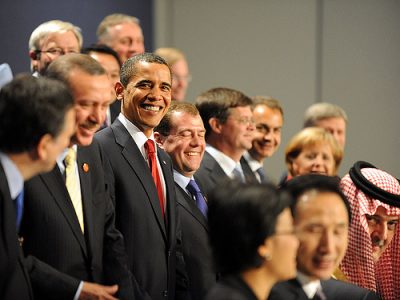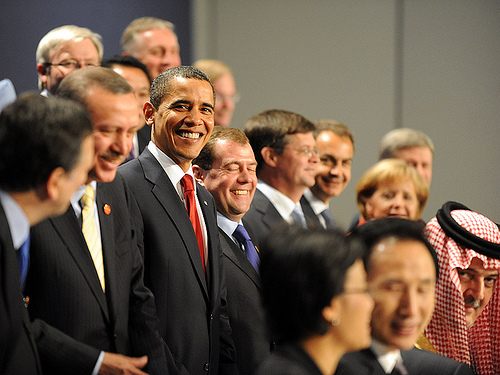 The G-20 has declared itself the “premier forum for international economic cooperation.” As President Barack Obama and his counterparts head into their summit in Toronto this weekend, however, there doesn’t seem to be a whole lot of cooperating going on.
The G-20 has declared itself the “premier forum for international economic cooperation.” As President Barack Obama and his counterparts head into their summit in Toronto this weekend, however, there doesn’t seem to be a whole lot of cooperating going on.
In advance of the meeting, Obama sent a letter to other G20 leaders encouraging them to continue their stimulus programs until the recovery is stronger. That was a very sensible request. Slashing public spending now, when unemployment is still rising in the euro zone and remains at 10% in the United States, could plunge us into deeper crisis and make it even more difficult to pay back public debts over the long run.
Key European leaders immediately rejected Obama’s plea. New UK Prime Minister David Cameron unveiled an emergency budget plan that will slash government spending by 25 percent. German Chancellor Angela Merkel, hit hard by the Greek crisis, and European Commission President José Manuel Barroso also made it clear they have shifted their focus to budget cuts.
At a public event on the G-20 in Toronto yesterday, Damon Silvers, the AFL-CIO’s Public Policy Department Director, said the Europeans’ reaction is like a “fiscal Smoot-Hawley,” referring to the notorious 1930 U.S. law that jacked up tariffs on imports, triggering a trade war. Smoot-Hawley is widely blamed for exacerbating the Great Depression. Budget slashing in Europe could have a similarly devastating ripple effect, as consumers in that region have less money to spend on goods and services.
But European leaders shouldn’t take all the blame for the lack of cooperative spirit going into this G-20 summit. Obama’s lecturing on stimulus spending may have gone over better if his administration had shown more openness to some of the European leaders’ priority proposals. Merkel and French President Nicolas Sarkozy have led a push for a G-20 agreement on financial speculation taxes (aka financial transactions taxes). They sent a letter of their own requesting that the matter be placed on the agenda in Toronto. Such a tax on trades of stock, derivatives, and other financial instrument could raise massive revenues for urgent needs.
So far, however, the Obama administration has opposed the idea, favoring a levy on top banks that would generate much less revenue and be aimed only at recouping bailout funds.
Obama may be the voice of reason on the immediate need for continued stimulus spending. But if we’re going to get back on a sustainable fiscal path in the medium term, we need to take seriously the need for major new revenue sources.
